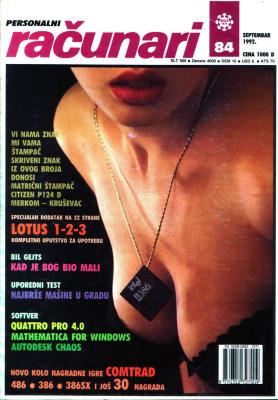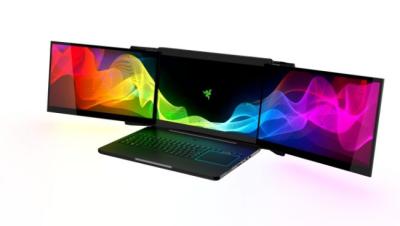Topic: COMPUTER - on January 6, 2017 at 2:05:00 PM CET
Yugoslavian Computer Magazine Cover Girls of the 1980s-90s
Računari was a computer magazine of the former Yugoslavia which lasted from 1984 until the late 1990s – surviving the economic turbulence and wars of the 1980s-90s, and even outlasting the country itself. The title simply means “computers” in Bosnian – and its content was just that: very bland, very technical, nothing flashy… but its covers were another matter entirely. Despite the very low-key tech content, the guys at Računari decided to put some spice on just about every cover. Nearly every issue featured a ravishing Eastern Bloc Beauty straddling computer hardware. Let’s have a look at some of these covers spanning the late 1980s and into the early 1990s. Enjoy.

... Link (0 comments) ... Comment
Topic: COMPUTER - on January 6, 2017 at 1:44:00 PM CET
Razer’s Insane Project Valerie Laptop Packs Three 4K displays
Two years ago at CES, Razer teased us with their Project Christine modular gaming PC. This year they decided to show off something a little more portable: a gaming laptop with three 4K displays.

geek.com I played Battlefield on Razer’s three-screen laptop
... Link (0 comments) ... Comment
Topic: COMPUTER - on December 22, 2016 at 4:53:00 PM CET
20 Questions Security Pros Should Ask Themselves Before Moving To The Cloud
A template for working collaboratively with the business in today's rapidly changing technology environment. Everywhere I go lately, the cloud seems to be on the agenda as a topic of conversation. Not surprisingly, along with all the focus, attention, and money the cloud is receiving, comes the hype and noise we’ve come to expect in just about every security market these days. Given this, along with how new the cloud is to most of us in the security world, how can security professionals make sense of the situation? I would argue that that depends largely on what type of situation we’re referring to, exactly. And therein lies the twist.
... Link (0 comments) ... Comment
Topic: COMPUTER - on August 16, 2016 at 4:26:00 PM CEST
What Is Phase Change Memory? Why Is It 1,000 Times Faster Than RAM?
The researchers are working hard to create new means to store data. PCM, about 1,000 times faster than RAM, is one such effort that’s being extensively developed by researchers and tech giants. Recent developments by Stanford and IBM are expected to make PCM research more mainstream.
... Link (0 comments) ... Comment
Topic: COMPUTER - on August 15, 2016 at 6:00:00 PM CEST
Secure Boot snafu: Microsoft leaks backdoor key, firmware flung wide open
Updated, August 12: Microsoft has now responded to the Secure Boot blooper. The company said: "The jailbreak technique described in the researchers’ report on August 10 does not apply to desktop or enterprise PC systems. It requires physical access and administrator rights to ARM and RT devices and does not compromise encryption protections."
... Link (0 comments) ... Comment
Topic: COMPUTER - on August 15, 2016 at 5:54:00 PM CEST
2 Gbps: New Speed Record Set For Data Transmission Using LED Light
A team of researchers has devised a new method to produce white light that supports data transmission rates up to 2 billion bits per second (2 Gbps). This light could be used to made efficient lighting systems and transmit information at the same time. The researchers expect that the white light LED bulbs will be replaced by the bulbs that generate white light using semiconductor lasers.
... Link (0 comments) ... Comment
Topic: COMPUTER - on July 19, 2016 at 4:14:00 PM CEST
Rätselhafter Riesendeal: Japanischer Milliardär kauft Chip-Designer ARM
Telekomkonzern Softbank übernimmt britische ARM Es ist ein Milliarden-Deal, der Rätsel aufwirft: Der japanische Konzern Softbank kauft sich den führenden Entwickler von Smartphone-Chips. Möglicherweise geht es um das zukünftige Geschäft mit unzähligen vernetzten Geräten im "Internet der Dinge". Die Firma, von der die Chip-Architektur in fast allen Smartphones und Tablets auf der Welt stammt, wird bald einem wagemutigen japanischen Milliardär gehören. Diese Vorstellung ist an sich schon denkwürdig, doch der am Montag angekündigte Deal birgt auch noch ein großes Rätsel: Was will Masayoshi Son überhaupt mit dem Chip-Designer ARM aus Großbritannien? Ins bisherige Kerngeschäft seines Tech-Konglomerats Softbank – Mobilfunk und Beteiligungen an Online-Diensten – lässt sich ARM jedenfalls nicht einfach so einbinden.
... Link (0 comments) ... Comment
Topic: COMPUTER - on July 19, 2016 at 4:11:00 PM CEST
ARM founder says Softbank deal is 'sad day' for UK tech
The founder of ARM Holdings has told the BBC he believes its imminent sale to Japanese technology giant Softbank is "a sad day for technology in Britain". Hermann Hauser said he was "very sad" at news of the £24bn ($32bn) takeover which was announced on Monday morning. The Cambridge-based firm designs microchips used in most smartphones, including Apple's and Samsung's. ARM, which was founded in 1990, employs more than 3,000 people. Mr Hauser called ARM Holdings his proudest achievement.
bbc.com The sell-off of British businesses like ARM must stop
... Link (0 comments) ... Comment
Topic: COMPUTER - on July 14, 2016 at 3:55:00 PM CEST
Linus Torvalds Is Again Mad Over “Sh!t Code”, Calls Some Linux Devs “Brain-damaged”
Linux Torvalds is again mad over some developers due to their “disturbing” coding style. He has bashed the networking developers by pointing out their “brain-damaged” commenting syntax and listed out the styles that a Linux kernel developer should use.
... Link (0 comments) ... Comment
Topic: COMPUTER - on July 7, 2016 at 5:00:00 PM CEST
Analysing NLP publication patterns
Recently, I got curious about finding out how much different institutions publish in my area. Does Google publish more than Microsoft? Which university has the strongest publication record in NLP? And are there any interesting trends that can be seen in the recent years? Quantity does not necessarily equal quality, but the number of publications is still a reasonable indicator of general activity in the field, how big the research group is, and how outward-facing are the research projects. My approach was to crawl papers from the 6 biggest conferences that are relevant to my research: ACL, EACL, NAACL, EMNLP, NIPS, ICML. The first 4 focus on NLP applications regardless of methods, and the latter 2 on machine learning algorithms regardless of tasks. The time window was restricted to 2012-2016, as I’m more interested in current publications.
... Link (0 comments) ... Comment
Topic: COMPUTER - on July 2, 2016 at 4:52:00 PM CEST
The WRT54GL: A 54Mbps router from 2005 still makes millions for Linksys
In a time when consumers routinely replace gadgets with new models after just two or three years, some products stand out for being built to last. Witness the Linksys WRT54GL, the famous wireless router that came out in 2005 and is still for sale. At first glance, there seems to be little reason to buy the WRT54GL in the year 2016. It uses the 802.11g Wi-Fi standard, which has been surpassed by 802.11n and 802.11ac. It delivers data over the crowded 2.4GHz frequency band and is limited to speeds of 54Mbps. You can buy a new router—for less money—and get the benefit of modern standards, expansion into the 5GHz band, and data rates more than 20 times higher.
... Link (0 comments) ... Comment
Topic: COMPUTER - on June 27, 2016 at 8:50:00 AM CEST
The Piracy Box Sellers and Youtube Promoters Are Killing Kodi
Over the past few years it’s become clear that many users have been watching pirated content using unofficial and unsupported add-ons that frequently break, and they are installing add-on repositories whose trustworthiness is questionable, leaving themselves open to numerous security exploits. Lately there’s even been a move to install “builds,” which intentionally break Kodi and, much like viruses, are almost impossible to uninstall, but have the benefit of adding LOTS of untrustworthy repos full of add-ons that don’t work.
... Link (0 comments) ... Comment










